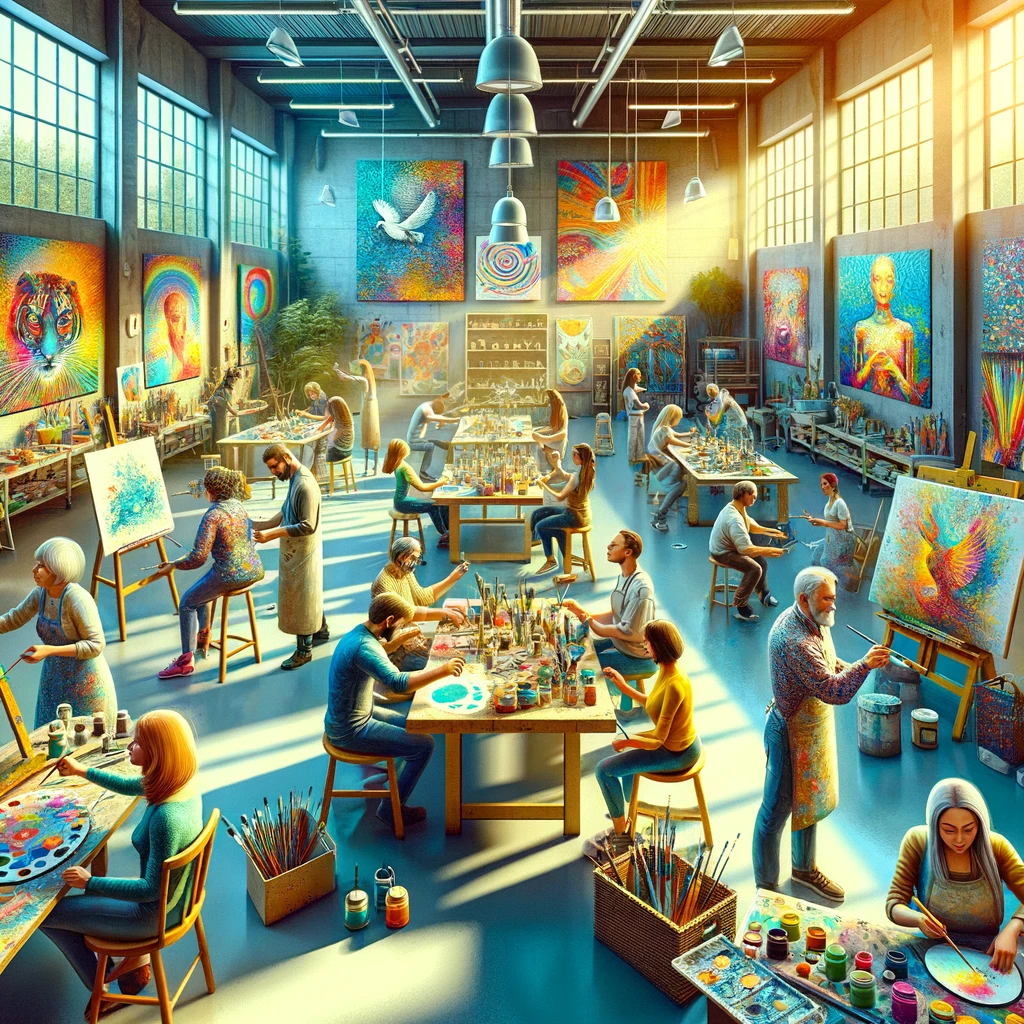The world of arts and creativity offers boundless opportunities for expression and communication, especially for individuals who are deaf or hard of hearing. In recent years, a variety of workshops and activities have emerged, specifically catering to this community, enabling them to explore their artistic talents in an inclusive and supportive environment.
Embracing Diverse Art Forms
The Deaf-Hearing Communication Centre (DHCC) exemplifies inclusivity in the arts, offering workshops designed for various groups including the deaf and hard of hearing. These workshops range from a few hours to multiple days, adapting to the needs of participants. DHCC’s offerings cover topics like self-advocacy, effective use of interpreters, and communication access rights, providing a comprehensive approach to arts education.
Bridging Communication Through Arts
Bridges for the Deaf and Hard of Hearing, with offices in Tennessee, Alabama, Kentucky, Mississippi, Arkansas, Virginia, and North Carolina, has a rich history dating back to 1927. They provide a range of services from education and outreach to case management and interpreting services. Workshops at Bridges often focus on Deaf culture, employing deaf and hard of hearing individuals, and communication strategies with law enforcement and other first responders.
Expanding Horizons in Education
The Learning Center for the Deaf offers a unique blend of activities, such as Camp Isola Bella for professional development in deaf education, and special events like the Deaf View Image Art (De’VIA) workshop, which caters to art teachers and De’VIA artists. Additionally, they provide training on trauma-informed care, emphasizing the importance of understanding trauma’s impact in educational settings.
Pioneering Early Intervention
The Laurent Clerc National Deaf Education Center, part of Gallaudet University, plays a pivotal role in developing educational resources and innovative instructional techniques for deaf and hard of hearing students. They focus on early intervention and childhood education, offering a comprehensive set of resources and guidelines for educators and parents.
Fostering Adult Education and Community Engagement
BridgesDHH also highlights the importance of adult education and community engagement. They offer specialized training for volunteers to assist the Deaf-Blind community and provide a GED program tailored for deaf and hard of hearing adults. Additionally, BridgesDHH organizes social activities and community-building events to strengthen bonds within the community.
Creativity and the arts play a crucial role in the lives of deaf and hard of hearing individuals, offering them a platform for self-expression and connection with others. The emergence of dedicated workshops and activities has not only fostered artistic talents but has also created inclusive spaces for learning, sharing, and celebrating diverse perspectives.

Integrating Technology in Art Education
In the realm of art education, technology plays a significant role, particularly for the deaf and hard of hearing community. Utilizing tools like video production with ASL interpretation and captioning, organizations like The Learning Center for the Deaf are making STEM subjects more accessible. This approach is not limited to traditional art forms but extends to scientific education as well, such as the ‘Signs of Quantum Science’ project conducted in collaboration with Harvard University. These initiatives demonstrate how technology can bridge communication gaps and make learning more inclusive.
Promoting Cultural and Linguistic Awareness
Cultural and linguistic diversity forms an essential part of art workshops designed for deaf and hard of hearing individuals. Organizations like BridgesDHH emphasize the importance of understanding the distinction between Deaf culture and the condition of hearing loss. They offer workshops that delve into Deaf culture, ASL, and the experiences of the deaf community. Such workshops provide a crucial platform for promoting awareness and understanding, which is instrumental in creating a supportive environment for artistic expression.
Tailoring Workshops for Specific Needs
Personalizing art workshops to meet the diverse needs of participants is vital. Programs like those offered by BridgesDHH include GED programs with interpreter and captioned support, law enforcement training, and community-building activities. These varied programs underscore the importance of tailoring workshops to address specific educational and community engagement needs, ensuring that every individual finds a space where they can express and explore their creativity.
Fostering a Community Through Art
Community-building through art is a powerful aspect of these workshops. BridgesDHH organizes activities like game days, potlucks, holiday meals, and theatre outings to foster a sense of community among deaf and hard of hearing individuals. These events are not just about learning art but also about building relationships and strengthening community ties. Through these activities, participants experience the joy of shared experiences and the solidarity of a community that understands and values their unique perspectives.
Conclusion
The inclusion of deaf and hard of hearing individuals in the arts through specialized workshops and activities is not just about providing access to art education. It’s about recognizing and valuing the unique perspectives they bring to the artistic world. These initiatives play a critical role in breaking down barriers, fostering community engagement, and enhancing understanding and appreciation of cultural and linguistic diversity. By continuing to develop and support these programs, we can ensure that the arts remain a vibrant, inclusive, and expressive platform for all individuals, regardless of their hearing abilities.
References
- Deaf-Hearing Communication Centre, Inc. Training & Workshops. DHCC
- Bridges for the Deaf and Hard of Hearing. Deaf And Hard Of Hearing. Bridges for the Deaf and Hard of Hearing
- The Learning Center for the Deaf. Consultation, Research & Training. The Learning Center for the Deaf
- The Laurent Clerc National Deaf Education Center. Early Intervention. The Laurent Clerc National Deaf Education Center
- Bridges for the Deaf and Hard of Hearing. ADULT EDUCATION & OUTREACH. Bridges for the Deaf and Hard of Hearing

